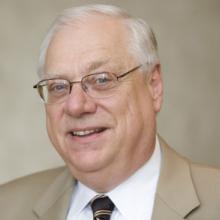Daniel Aleshire

Image via George Rudy/Shutterstock.com
“This is the first I know of an evangelical seminary with a free-standing requirement for graduation to participate in this kind of discrete training. There are other seminaries where sexual boundary, sexual abuse issues are part of another course or class. But it would not be a free-standing event, as Dallas is doing.”
Redeemer Presbyterian Church, one of the most influential evangelical churches in the country led by author and speaker Tim Keller, has partnered with a Mississippi-based school to form a seminary campus in New York City in 2015.
The partnership between Redeemer and Reformed Theological Seminary fits in with the desire of evangelicals to plant their flag in large cities such as New York. It also reflects the influence of Reformed theology on evangelical thinking, as well as the impact of megachurches on theological education.
And while many seminaries are still suffering declining revenues since the economic crisis of 2008, the model of building campuses in major cities has proved successful for the Mississippi flagship seminary.
Students in the New York City campus will be trained to start churches by pursuing a two-year master’s of arts degree in biblical studies at $430-450 per credit hour before receiving another year of pastoral church planting education from Redeemer. The campus will likely launch in Redeemer’s offices near Herald Square in Manhattan.
Theological education has increasingly left brick-and-mortar schools and headed back to congregations and family homes as more seminarians study online.
“The old move — uproot your family, get a new job, move to the seminary — that model isn’t working for so many people today,” said Ronald Hawkins, vice provost at Liberty University, which has around 9,000 students in its online seminary.
“They are looking for a way to increase their biblical theological knowledge, to expand their ministry skills and to remain within the context of the ministry setting.”
Despite “huge” hesitancy to allow online theological degrees, online education is growing, said Daniel Aleshire, executive director of the Association of Theological Schools, the main accrediting body for more than 270 seminaries and graduate schools.

